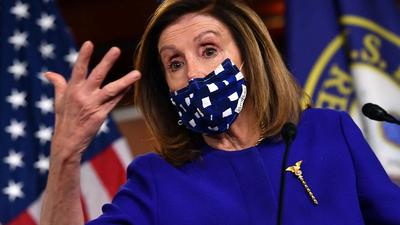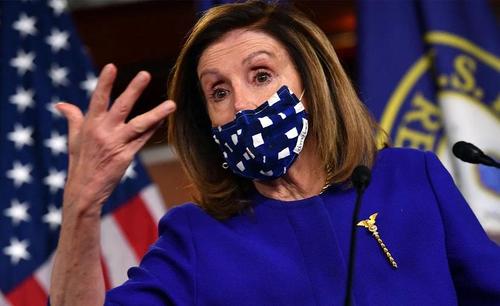
Next week is going to either be a massive victory for Congressional Democrats, or a deflating defeat which will send the Hill into chaos.

On Saturday, Pelosi warned in a “dear colleague” letter to members of the Democratic Caucus that they’ll have one week to “pass a Continuing Resolution, Build Back Better Act and the BIF” (Bipartisan Infrastructure Framework), adding that September 30th is a “date fraught with meaning” due to expiring programs that the Senate-passed BIF will provide fresh funding for, as well as the date that government funding will run out at midnight – risking a US default.
Gearing up for next week, Democrats on Saturday pushed the $3.5 trillion, 10-year Build Back Better act through the House budget committee, setting the stage for debate and a possible vote on Monday (but ‘only if Pelosi has the votes to pass’). The Speaker did not mention legislation to extend the debt ceiling.
🚨🚨🚨🚨PELOSI makes it official. Wants funding, infrastructure and reconciliation passed THIS WEEK.
Will make for one of the most intense weeks in congress. pic.twitter.com/oPUX8Xc3LT
— Jake Sherman (@JakeSherman) September 25, 2021
As the American Enterprise Institute’s Peter J. Wallison notes in The Hill, “It now looks as though Speaker Pelosi will allow a separate vote on the infrastructure bill on Monday, Sept. 27, and will urge Democrats to vote for it.”
Pelosi said she is “never” going to hold a vote on a bill that will fail, and suggests Monday vote on infrastructure deal will happen later in the week. “Let me just say we're going to pass the bill this week. I promised that we would bring a bill to the floor,” she says on ABC
— Manu Raju (@mkraju) September 26, 2021
This is a risky move, as House progressives have vowed to vote against the infrastructure deal unless it’s done in tandem with the $3.5 trillion ‘Build Back Better Act” – which was Pelosi’s original plan until a group of nine moderate House Democrats insisted on separate votes for the infrastructure bill and the partisan $3.5t bill which can only be passed via reconciliation – a budgetary procedure which only requires a simple majority.
In a Sunday appearance on ABC’s “This Week,” Pelosi said that it “seems self-evident” that the $3.5 trillion figure will go down.
“Yeah that seems self-evident. That seems self-evident” she said on ABC’s “This Week” when asked if she would acknowledge that there would be a lower total for the package,” she said, adding “I think even those who want a smaller number support the vision of the president.”
“We have to find our common ground, respectful of each other’s views. This isn’t about moderates versus progressives.” (it totally is).
Despite the House Budget Committee passing a resolution overnight calling for the $3.5 trillion reconciliation bill, @SpeakerPelosi tells @GStephanopoulos it "seems self-evident" that the final number will come out to be less than that proposed. https://t.co/vZ6UrUWOXI pic.twitter.com/7dGUzfkQW9
— This Week (@ThisWeekABC) September 26, 2021
Pelosi added that she would ‘never bring a bill to the floor that doesn’t have the votes,’ in regards to the bipartisan infrastructure deal.
"I'm never bringing a bill to the floor that doesn't have the votes."
Speaker Nancy Pelosi tells @GStephanopoulos that she may not bring the bipartisan infrastructure bill to the House floor Monday as she previously committed to. https://t.co/iBAc9TuzAq pic.twitter.com/AmWyFLu4YO
— This Week (@ThisWeekABC) September 26, 2021
*PELOSI VOWS TO KEEP THE U.S GOVERNMENT OPEN
*PELOSI: WON'T BRING BILL TO FLOOR THAT DOESN'T HAVE THE VOTES
*PELOSI SAYS HOUSE `MAY' PASS INFRASTRUCTURE PACKAGE MONDAY
— zerohedge (@zerohedge) September 26, 2021
As The Hill notes of the infrastructure package:
However, the bill’s future is uncertain, with progressive Democrats vowing to oppose the legislation unless the House first votes on a $3.5 trillion social spending package that serves as a second component of Biden’s Build Back Better plan.
Rep. Pramila Jayapal (D-Wash.), the head of the Congressional Progressive Caucus, said Friday that as of now, the infrastructure bill “cannot pass.”
Jayapal, who is scheduled to appear on both CBS’s “Face the Nation” and CNN’s “State of the Union” this week, is leading a group of progressive lawmakers demanding movement on the larger “family” package, which Democratic leaders are hoping to pass through reconciliation, thus bypassing a GOP filibuster in the Senate.
And while Jayapal and other House progressives may think they can simply kill Monday’s infrastructure vote – using its failure as leverage to pass the $3.5 trillion legislation, House Republicans can pull a fast one and upend their plans if enough of them vote for the infrastructure bill so that it passes.
That said, the $3.5 trillion plan is likely doomed either way in its current form – as moderate Democrats including Sen. Joe Manchin (WV) have vowed to oppose it until it’s much smaller, and has realistic funding solutions. Given Democrats’ threadbare majority in the Senate, and universal opposition by Senate Republicans, Manchin and other moderate Democrats are in the driver’s seat when it comes to the larger package.
Republicans have called the $3.5 trillion package unneeded and too expensive, given the $28 trillion national debt.
“This bill is a disaster for working-class families,” said Rep. Jason Smith (R-MO), the top Republican on the budget committee. “It’s a big giveaway to the wealthy, it’s a laundry list of agenda items pulled right out of the Bernie Sanders socialist playbook.”
Meanwhile, moderate Democrat Scott Peters of California joined all 16 Republicans on the committee in opposition to the legislation.
Well, this is raising the stakes: "This week, we must pass a Continuing Resolution, Build Back Better Act and the BIF," writes @SpeakerPelosi to colleagues this afternoon. pic.twitter.com/6RGenmbIqj
— Mike DeBonis (@mikedebonis) September 25, 2021
The last vote Pelosi announced on Saturday is a ‘continuing resolution’ (CR) – a stopgap bill needed to fund the federal government at the start of the new fiscal year on Oct. 1. This comes after the House already passed a stopgap spending bill which would suspend the debt ceiling until Dec. 16, 2022 – however it will undoubtedly die in the Senate at the hands of Republicans, where at least 60 votes are needed to send it to President Biden’s desk for approval.
